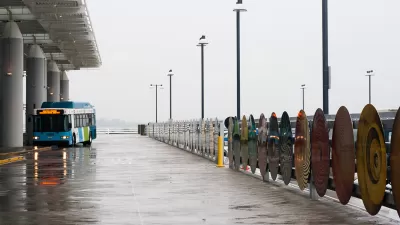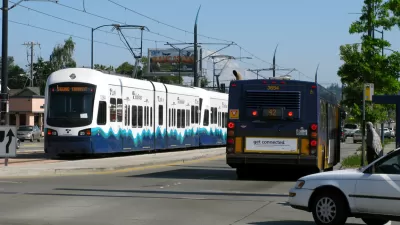Seattle Transit blog compares rail investments from five cities around the country.

Zach Shaner compares the transit planning in various cities around the country. Starting by comparing the cost of Seattle's current and planned transit investments under ST2 and ST3 with Portland's existing MAX Blue Line. To make the big point of the article Shaner uses a word some might consider inappropriate, so beware:
We frequently wonder around here [in Seattle] why our transit-building schemes are slow and expensive, and I’ve offered my best attempt at the process side of the equation already. But today I want to propose another reason: to put it bluntly, we’re building the good shit and nobody else is.
Shaner is echoing the arguments of an article by Angie Schmitt from May, which parsed the specifics of the lowest performing rail transit lines in the country. Shaner's approach differs slightly, comparing the complete rail portfolio of the cities making rail transit investments and finding examples of success as well. The article compares the transit systems of Dallas, Denver, Portland, Los Angeles, Minneapolis, and Seattle (the latter is considered as built in 2023) on the metrics of frequency, capacity, grade separation. The comparison reveals that neither all transit systems nor all transit investments are created equally—and as such, they can't be expected to deliver the same results.
FULL STORY: Seattle is the Tortoise, Portland the Hare

Maui's Vacation Rental Debate Turns Ugly
Verbal attacks, misinformation campaigns and fistfights plague a high-stakes debate to convert thousands of vacation rentals into long-term housing.

Planetizen Federal Action Tracker
A weekly monitor of how Trump’s orders and actions are impacting planners and planning in America.

Chicago’s Ghost Rails
Just beneath the surface of the modern city lie the remnants of its expansive early 20th-century streetcar system.

Bend, Oregon Zoning Reforms Prioritize Small-Scale Housing
The city altered its zoning code to allow multi-family housing and eliminated parking mandates citywide.

Amtrak Cutting Jobs, Funding to High-Speed Rail
The agency plans to cut 10 percent of its workforce and has confirmed it will not fund new high-speed rail projects.

LA Denies Basic Services to Unhoused Residents
The city has repeatedly failed to respond to requests for trash pickup at encampment sites, and eliminated a program that provided mobile showers and toilets.
Urban Design for Planners 1: Software Tools
This six-course series explores essential urban design concepts using open source software and equips planners with the tools they need to participate fully in the urban design process.
Planning for Universal Design
Learn the tools for implementing Universal Design in planning regulations.
planning NEXT
Appalachian Highlands Housing Partners
Mpact (founded as Rail~Volution)
City of Camden Redevelopment Agency
City of Astoria
City of Portland
City of Laramie





























